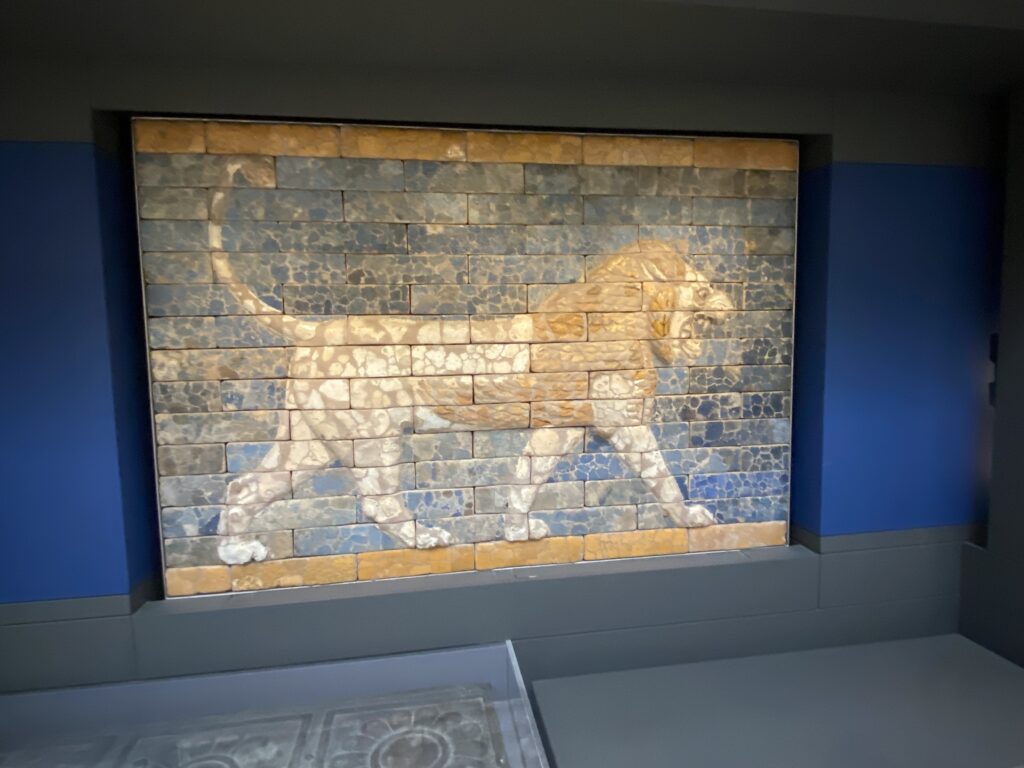
This lion of Babylon is in the Louvre museum
Dear reader,
Four different drinks daily form the larger part of my diet. The rest is more solid, of course. It consists of nuts and fish, but fish much less than before. Fish can easily lead to the intake of too many harmful substances like heavy metals and antibiotics. I also eat some organic chicken, whole-grain bread and pasta, eggs, goat cheese, and a few pieces of dark chocolate. Plus, of course, the occasional other foods.
A. My four drinks
- Homemade vegetables soup (every evening)
- Lemons and/or lime juice (morning + during day drink)
- Fruit/vegetables smoothie with seeds and supplements (late morning and luncheon)
- Collagen/creatine/protein shake (morning)
(note, below I put the links of my earlier blogs I made on the first three drinks).
B. The fourth one? Every morning, half a liter of water mixed with lemon juice. Add 2 x 5 grams of collagen and creatine. Include 25 grams of a “complete” protein (=a protein providing all 21 amino acids).
All three ingredients of my fourth drink are proteins. Yet, collagen and creatine have specific purposes. It differs from the “complete” protein powders due to a different, less complete amino acid composition.
A good collagen powder is rich in certain amino acids. These include glycine, praline, and hydroxyproline. They are important for the body’s synthesis (=production) of collagen and other structural tissues. Nevertheless, collagen is relatively low in “essential” amino acids, particularly tryptophan.
So in short, collagen nor creatine have all the amino acids our body needs. For my protein needs I take, in addition to food (pay attention to protein rich food!) a complete (a full spectrum) protein powder that contains all the existing 21 amino acids, including the 9 so called “essential” amino acids. “Essential” in the sense that the body does not produce them and nutrition is needed to get them. As we know, these amino acids form 1000’s of different proteins. These proteins are better known as the building blocks of life.
C. “Might work, but no harm”-principle
I realize that not all claims about collagen are proven. For me, taking collagen falls in the category: “it does not hurt (except your wallet).” It might actually do some good. Life is short and there are many developments on going. However, one does not have the time to await the result of all research. For that reason I do no mind taking supplements that are promising, but not scientifically proven. It is important though that they should not do harm. Precisely because of potential harm I have decided not to take Omega-3 supplements anymore. https://shakethehealthtree.com/index.php/2025/03/21/21-omega-3-supplements-often-no-need-to-take-them-health-project99/
Ok, one by one. Why collagen? Why creatine? Why a wide range/complete protein?
D. Protein
To start with the last one. From my extensive internet and Youtube based research on protein, I drew main 3 conclusions: 1) most people have a too low intake of protein, especially in the light of the latest insights that go for 1.2 – 1.5 grams of protein per kg body weight. In my case I raised protein intake from 70 grams to 120 grams. 2) Your body can effectively only process about 25 grams per time slot of a few hours. This means that you have to spread your protein intake during the day. That is why I put protein in my smoothie. I also added it to this fourth early morning drink. 3. Make sure that you have a protein of good quality that has all the 21 amino acids. And do not worry if you take a bit too much. It will do no harm, except to your waistline.
I already did an extensive blog on protein https://shakethehealthtree.com/index.php/2025/02/25/5-power-to-the-proteins-and-also-enough-is-not-always-enough/#comment-13
E. Why creatine?
Certain claims about creatine have withstood scientific scrutiny. This unlike collagen where studies are still ongoing with only positive indications that collagen might have some positive effect.
Creatine is not a protein. It is a compound related to amino acids. These amino acids are the building blocks of proteins. Specifically, creatine is synthesized (produced) from three amino acids: arginine, glycine, and methionine.
Creatine is stored in the muscles. It is used to replenish “adenosine triphosphate” (ATP), the primary energy carrier in cells. This occurs during short bursts of high-intensity physical activities, such as weightlifting or sprinting. This ability to rapidly regenerate ATP makes creatine a popular supplement among athletes. Bodybuilders also favor it to improve performance and increase muscle mass. Also non-athletes profit as creatine contributes to stronger muscles and improves endurance.
F. Best creatine is creatine monohydrate
There are different kind of creatine. The one most recommended is creatine monohydrate. While there are other forms of creatine available on the market—such as creatine ethyl ester, creatine hydrochloride, and buffered creatine—none have shown to provide the same benefits as creatine monohydrate. It is also this creatine that I take.
G. Collagen
Collagen is a protein found in abundance throughout the body. Often considered the glue that holds the body together, collagen offers many benefits. It supports the skin’s texture and elasticity. It also keeps your joints moving smoothly and much more.
As you get older, however, collagen production starts to diminish, which as we know has very visible results. Our wrinkles were not there at our 20’s nor was our dry skin. This lack of collagen is becoming especially notable in your 50’s and later. Many other factors can also interfere with collagen synthesis (=production). These factors include smoking, sun exposure, and a poor diet.
Fortunately, there are plenty of ways that can help boost collagen levels, some proven, some not. This varies from food, LED masks to using a collagen supplement. In a later blog I will dive deeper into collagen. For now, it suffices to say that both LED masks and collagen supplements might show promising results. An increasing number of tests support this. Nevertheless, there is no established science yet that confirms that certain supplements lead to collagen production in the body. Research is still ongoing.
Emphasizing a nutrient-dense diet is proven to keep higher collagen levels. This diet includes lots of antioxidants and vitamin C. These nutrients can be found in fresh vegetables, fruits, herbs, and spices.
H. Attributed positive effects of collagen
Increasing your intake of collagen is said to offer several benefits. You can do this with foods, collagen supplements or a combination of both. It supports a healthy gut and impacts gut lining integrity. It supports the health of your joints, tendons, and connective tissue, impacting comfort and mobility. It helps to promote healthy hair, nails, and skin, including skin elasticity. It assists in building muscle. Lastly, it supports the health of the heart and blood vessels.
I. Just to know: collagen supplements prompt collagen production
Collagen supplements do not deposit collagen on the desired places in your body. What it does is stimulating your body to intensify collagen production itself. It acts as a signaling molecule to prompt extra collagen production by the body.
J. Safety
Collagen (nor creatine) supplements are not regulated as strictly as pharmaceuticals. The quality and content of collagen products can vary widely. Also important to realize that there is no such thing as vegan collagen. Collagen powder is made from animal skin and bones. I initially took two collagen types, one based on cows products and one based on fish. I switched to collagen made from bovine products alone. Fish-based collagen carries a greater risk of contaminated produce. Most producers from fish based collagen are a bit sketchy on the origin of its material.
K. My experience
I focus on a collagen-friendly diet and take collagen supplements. Occasionally, I use an LED mask, and my wife insists that I apply certain moisturizing ointments. Given how my parents aged gracefully, I likely have good anti-wrinkle genes. However, since I began taking collagen powder, I’ve noticed a clear improvement in my skin—my neck is smoother and tighter, and my face appears more youthful. This change is likely due to the collagen powder, as my diet was already rich in collagen-friendly foods.
This was the description of the last of my four drinks. I hope it inspires you. As promised herewith the links to the other three drinks.
Enjoy!
Robert, your health friend

Discover more from Health Project 99+ (in good shape)
Subscribe to get the latest posts sent to your email.
